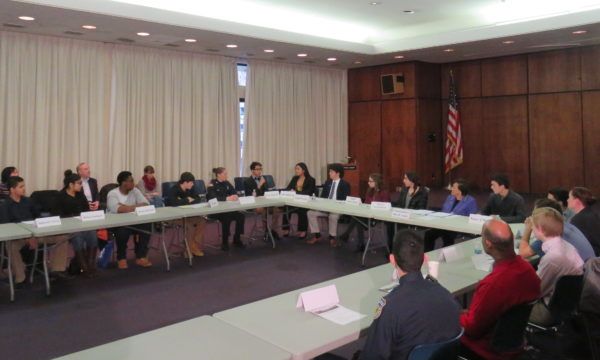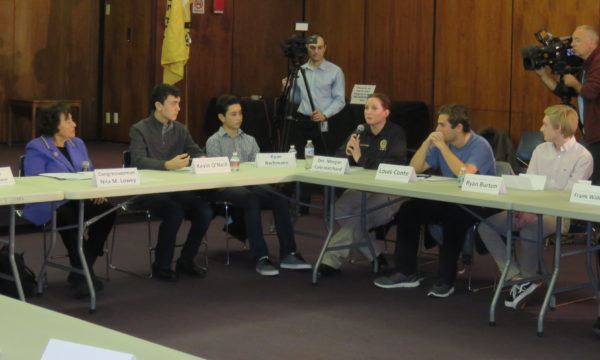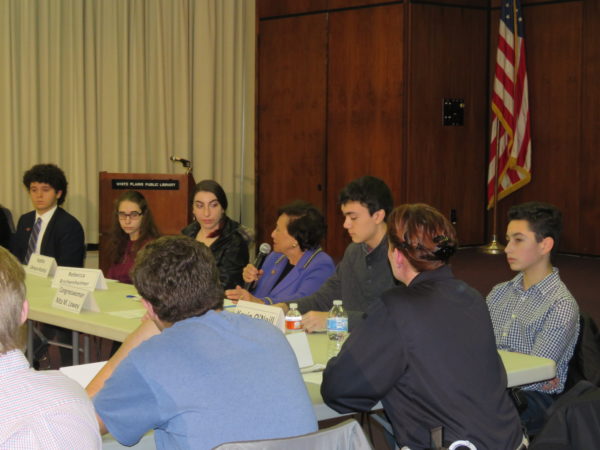Students Meet with Rep. Nita Lowey and Law Enforcement Officers to Discuss Gun Violence in Aftermath of Parkland Massacre
White Plains, NY, February 27— At the outset of a round table discussion about gun violence–with over a dozen Westchester students and several law enforcement officers participating–Congresswoman Nita Lowey expressed her frustration over the refusal of the powers that be in Washington to address a range of gun control reform initiatives she has introduced over her years in office.*
“I could walk you through the legislation that I have introduced,” she stated, calling out Speaker of the House Paul Ryan, in particular. “But I’m here today to listen to all of you, to get all your ideas.”
The students gathered in the auditorium of the White Plains Public Library on February 23 proceeded to share their concerns and their ideas in the aftermath of the Parkland massacre that took 17 lives on Valentine’s Day.
Frank Williams, Executive Director of the City of White Plains Youth Bureau, attending too, said it is “important to speak up and speak out… One day, it was in Parkland, Florida; the next day, it could be in our own community. We need to lead our community and nation.”
The kids shared this in common: They want to be heard. They also were nearly unanimous in desiring a ban of assault weaponry (outside New York State too), greater campus security, and they all want improved background checks.
Ryan Burton, a sophomore from Pleasantville High School, stated: “Students have a voice. We matter.” Kevin O’Neill, a senior from the same school: “We feel very passionate.” Rebecca Bachenheimer of Horace Greeley High School: “I am happy to have this voice I can use.” From White Plains High School, stated Melissa Rodriguez: “We want to use our voices to help ourselves and generations to come.” Ari Silver, a junior at Greeley, too: “If we don’t speak now, then what’s going to happen next?”
Michelle Mazzocchi of the New Castle Police Department, and the Chappaqua Central School District community resource officer, said she is working anew with all six schools in the District. “We are working on building a rapport with our schools to make sure kids are safe when they go into school.”
Lowey asked ‘what positives’ the kids have witnessed in their schools since the shooting.
Joseph Kennedy of Iona Prep said his school has implemented the use of ID cards with doors locked at all times.
The kids who attend schools with open campuses with multiple entry points expressed acute worry and a desire to either limit entry points, establish a ‘single point of entry’ or strengthen existing ones. “If someone who looks like me walks in, anything can happen. I think we need more security, more check points,” one student said.
“What scares me the most is not much has changed at all,” one student said, referring to the ease anyone has gaining access to automatic rifles. “There’s not much a school can do if someone like that who is so scary and determined walks in with a gun.”
Henry McCants of White Plains High School advocated stricter background checks everywhere: “Not everyone should be able to own an automatic weapon. People with mental disabilities shouldn’t.”
Det. Morgan Cole-Hatchard from the Pleasantville Police Department lamented that there was too little follow up after acquiring a gun permit. “People’s circumstances change,” she said. “They may experience physical and mental health decline. If I have to renew my driver’s license, people should have to renew their permit.”
Lowey asked all gathered whether persons on the terrorist watch list should be permitted to purchase guns, another piece of legislation that has been thwarted. No one advocated that. “I’m glad that’s unanimous,” she said.
She noted that the NRA has extraordinary power, and referred to a listing of members of Congress and Senate who receive”an enormous amount of money” from the NRA. “People are so afraid of them,” said. “Not me, though. I’m proud of my zero rating from them. “Those who get a lot of money from them are quick to introduce legislation (the NRA pushes) like conceal carry laws. “Everyone carrying a gun is not the answer.”
One student asked Lowey to address campaign finance reform, too. “Without a doubt the amount of money spent in these elections is obscene. The Koch Brothers are spending mega millions, and organizing again,” she answered.
She told the kids that people like former Congresswoman Gabby Giffords, “who has recovered somewhat, travels with her husband to support legislation to oppose NRA initiatives. She was shot in broad daylight.”
Joseph from Iona Prep was for conceal carry. He said he “learned from my dad “an officer with the NYPD for 25 years” that it is “better to have it and not need it than to need it and not have it.”
One home-schooled student, Sophia Libman-Roshal, disagreed and advocated for the reinstatement of an assault weapon ban. “I really don’t want to get shot,” she said.
Rebecca stated that she does support the Second Amendment, but noted potential dangers with conceal carry. “How many are going to get shot first, getting into the holster and out, there can still can be misfiring. You may not be able to stop a shooter in time.”
Said Ryan: “The AR-15 is almost identical to the M-16 used by the military. Why are these even in the hands of civilians? It is not right.”
Lowey offered that “the NRA should either disappear or to work with us to at least be open to some sensible gun legislation.” She encouraged all the kids “to talk to your parents and neighbors about the powers of your vote. Make sure everyone understands what you stand for and what you believe in.”
“Too many people don’t exercise the right to vote,” she added. She thanked Indivisible Westchester for “registering people. They are making an amazing difference.”
Regarding ‘conceal carry,’ Lowey said that she is against having ‘so many weapons out there.”
“Consider if two people fight on a bus. Not everyone is as responsible as your father,” she said to the young man from Iona.
“Does anyone think we should be able to purchase assault rifles?” Lowey asked the group. No one responded in the affirmative.
“Ok, we should take that off the table too.”
One student suggested: “Rifles should be completely removed from society. If anyone wants to use an AR-15, they should go somewhere. Even if you are responsible, go to a shooting range, and hand the gun back when you are done.”
Another said people buying need to be reminded of the dangers of weapons. “What is their need for automatic firing to feel protected?” he asked.
Lowey said buy-back programs have been successful. “We should probably do more of them.” She lauded the recent Westchester County legislation closing down the Gun show at the County Center. Gun violence is so simple’ yet solving the issue so complicated, she said. “There is no reason that at least some of the legislation could pass to show progress.”
“No youngsters should feel their lives are in danger when going to school,” she said.
Detective Morgan Cole-Hatchard from the Pleasantville Police Dept. expressed reservation over an outright ban. “It is my personal opinion that unfortunately the second you make an all encompassing ban on anything, it immediately becomes desirable on the black market, expensive and lucrative to anyone with access to them.”
The option of arming teachers, as advocated recently by the President, was discussed too.
A White Plains High student: “With guns present you are way more likely to have an accident.”
NCPD’s Officer Mazzocchi commented against this option: “Teachers went to school to teach; this is not what they signed up. Arming teachers is unsafe, and will scare students.”
Det. Morgan Cole-Hatchard talked about the hazards of arming teachers. First, she explained that “active shooter training” was instituted in police departments around the country followed the massacre at Columbine. She said at Parkland, “the officer who arrived took a long time to respond… and waited for a Swat team,” but that according to active shooter protocol, “If I’m the first one there, I’m going in and going after that person to get rid of that threat. If it’s two people, two go in, or if three, we all do. There are scenarios we go through… We walk through and know our schools, so if a call comes in and someone’s in the library, all of our officers know where that is and the quickest way to get there, so help is coming, but we are going in.
As for armed teachers, the Pleasantville Detective added:
“If I’m going into a school and a quarter of the teachers are armed… Some teachers look pretty young these days,.. we could have a bad situation.” It’s unlikely that those teachers would go through the same active shooter training that a police officer goes through, she added.
Another student from White Plains High School does not necessarily oppose arming teachers but limiting this option. He said it was ‘debatable’ and that it should include “only teachers who volunteer: and that there should be designated locations around the building with access to weapon.
“Only designated teachers go who are willing to put their lives on the line, grab a weapon and defend a school,” he said.
Another student said she’d feel much safer with more officers stationed in and around schools instead. “I’d feel less safe with teachers armed. Most would not know how to defend themselves in a school shooting. There are plenty of teachers who become criminals too.”
Lowey had invited these students to participate in the round table after several reached out to her expressing their fear of gun violence in their communities, particularly in their schools, as well as their frustration with congressional inaction on gun violence.
In a post roundtable statement, Lowey added: “These mass shootings, including the tragedy in Parkland, Florida, continue to shake all of us to the core, and students are left fearful for their safety. That’s unacceptable, and congressional Republicans must join Democrats in commonsense reforms to reduce gun violence, keep guns out of the hands of dangerous people, and improve public safety. The students I spoke with today demand action, and it’s past time that the Republican-controlled Congress take meaningful steps to end this nation’s gun crisis.”
* From www.lowey.house.gov: Lowey is a member of the congressional Gun Violence Prevention Task Force and has been a leader in fighting to prevent gun violence, including working to strengthen background checks, close the terror gap loophole, and ban assault weapons and bump stocks. Last Congress, Lowey introduced the NICS Community Protection Act, which would close the Charleston loophole by providing 14 businesses days rather than three for a background check to be completed by the FBI’s National Instant Criminal Background Check System (NICS). This week, Lowey sent a letter to House Speaker Paul Ryan urging him to allow a vote to lift the ban on federal gun violence research. As Ranking Member on the House Appropriations Committee, Lowey has repeatedly offered an amendment in the committee to provide funding for the CDC to conduct gun violence prevention research.
According to data from the U.S. Centers for Disease Control and Prevention (CDC), on average 96 Americans, including seven children and teens, are killed with guns every day, while nearly 13,000 are the victims of gun homicides every year. According to The American Journal of Medicine, among high-income nations, 91 percent of children 14 and under who were killed by a firearm lived in the United States. The U.S. has the highest rate of gun ownership in the world as well as a significantly higher gun homicide rate than other advanced countries.
